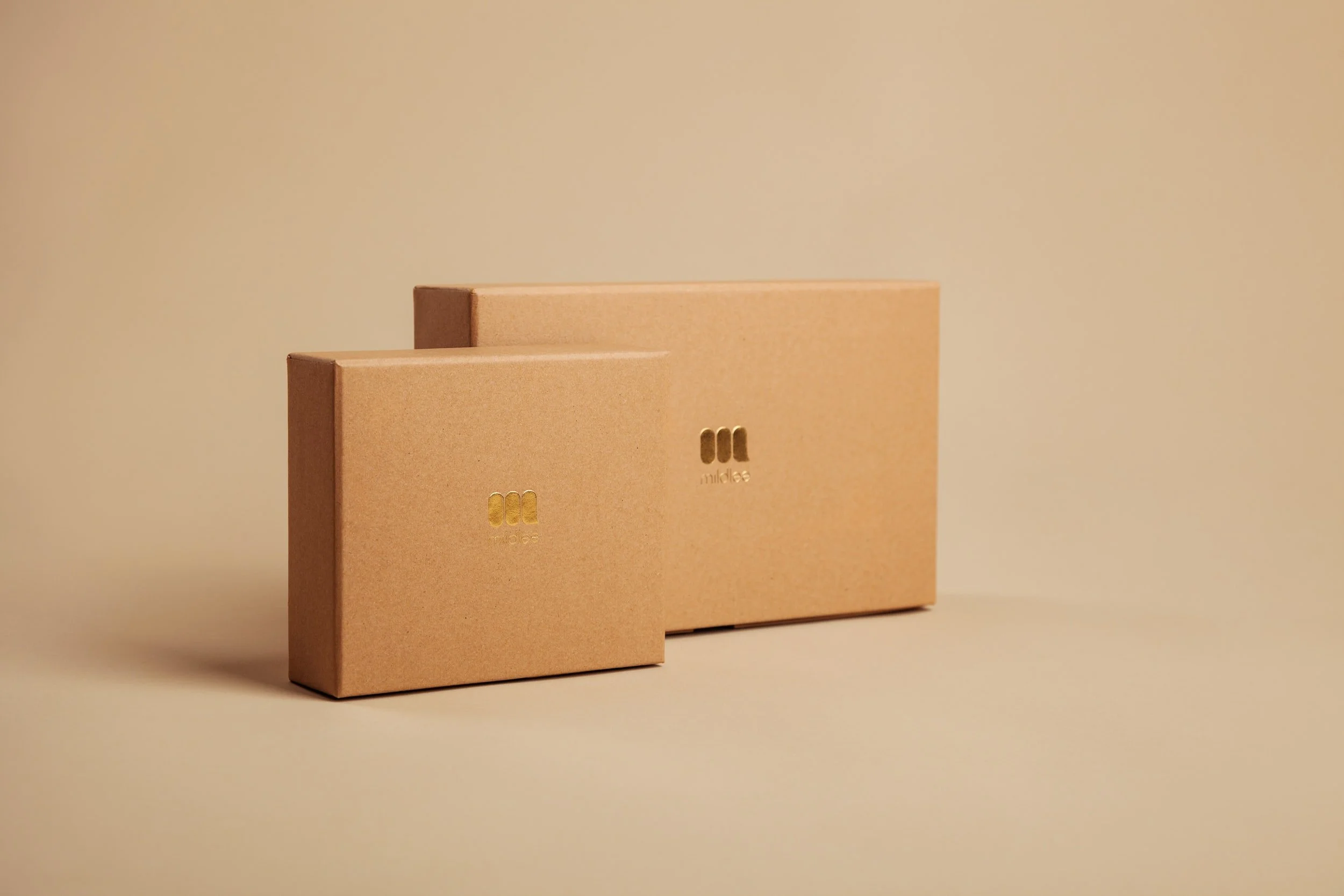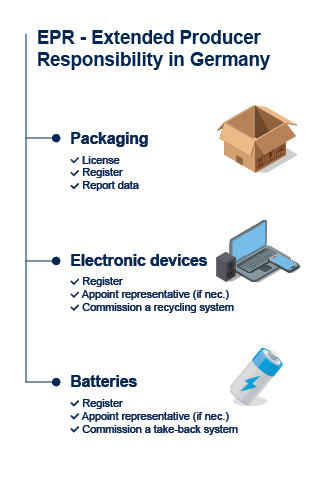

Explaining Extended Producer responsibility (EPR)
Extended producer responsibility (EPR) is a principle whereby merchants and manufacturers are responsible for a product throughout its lifecycle: from design to disposal and recycling. Nor is the focus merely on the product itself. EPR accounts in particular for all of the packaging and (product) parts placed on the market: these have to be disposed of by the consumer, and the product distributor is again assigned responsibility for these disposal and recycling processes.
In Germany, a merchant’s extended producer responsibility covers packaging, electrical appliances and batteries. The regulations for these three areas are each covered by separate legislation and also differ in some respects. As often used by marketplace operators, EPR should therefore be understood as an umbrella term for these three areas.
Are you affected by EPR regulations as a merchant or manufacturer?
German laws that put the Extended Producer Responsibility principle into practice – the Packaging Act, Electrical and Electronic Equipment Act and Battery Act – uniformly refer to companies affected as ‘producers’ (Hersteller). But who does ‘producer’ refer to, exactly?
Extended Producer Responsibility: Am I responsible?
A ‘producer’ in the sense of an extended producer responsibility is the company that first places a piece of packaging, an electrical appliance or a battery on the market in Germany. Accordingly, EPR regulations not only affect businesses based in Germany who manufacture and distribute products but also encompass importers involved in importing relevant products onto German territory as well as companies that, while domiciled outside Germany, nonetheless sell their products to German consumers.
Example: Marketplace merchants who sell to German consumers from outside Germany are always affected by the EPR regulations for packaging because they place sales packaging subject to licensing requirements on the market. Other legal duties relating to electrical appliances and batteries may also apply, depending on the product portfolio.
Extended Producer Responsibility: What action should I take as a ‘producer’?
You need to register and ensure that you commission a recycling system to handle the professional disposal of the packaging, electrical appliances, and batteries that you place on the market.
For full details of what you need to do, take a look at the step-by-step guides that we have prepared for each of the affected categories: packaging, electrical appliances and batteries. Feel free to contact us for more information.
How do marketplaces like Amazon fit into the picture?
Owing to the sheer volume of merchants that sell via marketplaces like Amazon, eBay, etc., recent legislation has increasingly tasked operators with making the business handled by their platforms more sustainable. In Germany, the relevant laws are the Packaging Act, the Electrical and Electronic Equipment Act and the Battery Act, which impose duties of control on marketplace operators. To fulfil these duties, operators must ensure that those of their merchants who sell to Germany comply with the extended producer responsibility (EPR) that is incumbent on them as a result of their goods (electrical appliances and batteries) and their packaging. As proof of compliance, merchants must provide marketplaces with an ‘EPR number’.
For packaging, marketplaces like Amazon must have completed these checks by no later than July 2022. Merchants unable to provide an EPR number for their packaging by this date are prohibited from using the marketplace to sell to German customers.
From January 2023, these duties of control for marketplaces will be extended to electrical appliances and batteries.
For details of the requirements and Amazon’s approach to handling EPR numbers: Click here.
Packaging
How to ensure compliance in Germany:
To ensure compliance with the German Packaging Act, affected merchants must fulfil three duties. These must be fulfilled BEFORE the merchant ships packaged products to Germany:
1. License packaging: Conclude a licensing agreement for your packaging quantities with a dual system
2. Register as a ‘producer’ with the LUCID packaging register managed by the Central Agency Packaging Register (ZSVR): Register here
3. Declare the name of your dual system and the packaging quantities you have licensed to the LUCID packaging register
How to provide proof of compliance:
You will need two forms of proof to ensure you can continue to sell on your marketplace:
• Your proof of system participation: Once you have concluded a licensing agreement with a dual system, you can provide proof of this with a certificate or the invoice from your system provider. Provide your marketplace operator with one of these documents.
• Your EPR number: After completing LUCID registration, you will receive your individual registration number (EPR number). Forward this number to your marketplace operator.
Electrical appliances (WEEE)
How to ensure compliance in Germany:
To ensure compliance with the German Electrical and Electronic Equipment Act, affected merchants must fulfil three duties. These must be fulfilled BEFORE the merchant ships packaged products to Germany:
1. For merchants domiciled in Germany: Register your electrical appliances with the Stiftung EAR as a ‘producer’: Register here
2. For merchants not domiciled in Germany: Appoint an authorised representative (mandatory for merchants not based in Germany)
3. Providing a guarantee and storing this with the EAR
4. Commission a recycling system with the collection and sorting of your waste electrical equipment
By the way, you can also hand over your duties completely and sit back and relax. You can find more information here.
How to provide proof of compliance:
You will need the following proof to ensure you can continue to sell on your marketplace:
• Your EPR number: After completing EAR registration, you will receive your individual registration number (EPR number). Forward this number to your marketplace operator.
Batteries
How to ensure compliance in Germany:
To ensure compliance with the German Battery Act, affected merchants must fulfil three duties. These must be fulfilled BEFORE the merchant ships packaged products to Germany:
1. Register your batteries with the Stiftung EAR as a ‘producer’: Register here
2. For merchants not domiciled in Germany (optional): Appoint an authorised representative
3. Commission an approved take-back system with the collection and sorting of your batteries
How to provide proof of compliance:
You will need the following proof to ensure you can continue to sell on your marketplace:
• Your EPR number: After completing EAR registration, you will receive your individual registration number (EPR number). Forward this number to your marketplace operator.



